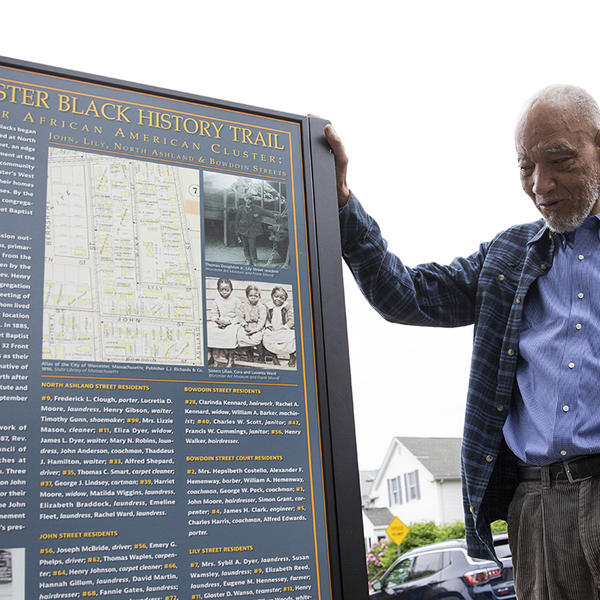A who's who of Worcester dignitaries assembled at the corner of John and North Ashland Streets on June 2, including the mayor, the acting city manager, several city councilors, a representative from a Congressional office and more. Though one individual received more applause and praise than anyone: Thomas Doughton, Holy Cross senior lecturer for interdisciplinary and special studies.
While Doughton attempted to deflect any recognition at the debut of Worcester's new Black History Trail, he is credited as one of the sparks that led to its creation.
"Dr. Doughton is really the straw that stirs the drink," said Khrystian King, Worcester City Councilor-at-large.
Through years of collaboration between community members, the city of Worcester, Holy Cross, the Worcester branch of the NAACP, the Laurel Clayton Project and Doughton, New England's second-largest city created a Black History Trail, establishing several landmarks of historical significance throughout the city.
Thursday's ceremony unveiled the first of five trail sites, with dozens more expected to be honored in the future.
"This project came about because the community, as some of us perceived it, felt they needed to be responsible for its own history in a dynamically engaged representation of the experience of people of color in Worcester," Doughton said.
He noted it's common for Black history to be told through the eyes of the dominant culture in the United States, which tends to withhold portions of the whole story.
"The rethinking of African American history in New England, at the moment, has a lot to do with making members of the dominant culture feel comfortable about the past," Doughton said. "That comfort is inappropriate in many ways."
The hope for the Black History Trail is to tell the unfiltered stories of those who lived in the city beginning as far back as the 18th century. "A project like this could be successful if it gets people to realize that people of color, people of African heritage — particularly enslaved people of the first quarter of the 18th century — have been here in Worcester and have been an important part of Worcester," said Doughton, who teaches the Holy Cross course Worcester and Its Peoples. In playing a role in bringing to life Worcester's history, the College has offered courses on the history of Worcester for more than two decades.
Inaugural trail sites remember the history of John Street and North Ashland Street, such as the Baptist church; the homes of jazz musician Freddie Bates and the Cullys, a family known for its music, entertainment and fashion; and Samuel Langford, an athlete termed the "greatest fighter nobody knows" by ESPN.
Holy Cross has aided in retelling those stories not only through Doughton, but also through the creation of a website and digital interaction that will debut soon throughout the trail.
"The Worcester Black History Trail offers an inclusive look at our city’s history and prompts reflection on how the past may shape our future," Holy Cross President Vincent D. Rougeau said. "We look forward to finding ways to promote the trail to all members of our campus community and to further integrate the trail’s historical and cultural significance into the academic life of the College. We are grateful to have been a part of this extraordinary project."
QR codes will allow people to learn more about the history of the respective areas. Doughton anticipates upwards of 30 sites across the city, including some QR codes built into sidewalks for pedestrians and information seekers to use.
Che Anderson '11 arrived on The Hill from New York City, but fell in love with Worcester and has remained ever since. He began working on the trail project as a member of the city’s administration and continues to be an active participant.
"I firmly believe that those who don’t know their history are doomed to repeat it," he said. "I think we’re sadly seeing that through our country in so many ways. Worcester is a microcosm of that. So having the opportunity to learn the stories, the wins, the losses, the triumphs and the injustices the Black community has had in Worcester, for me, it's an amazing perspective."
Worcester Black History Trail Opens as Community Lauds Holy Cross Faculty Member

Senior lecturer Thomas Doughton credited as one of the sparks that led to its long-anticipated creation and debut.
Read Time
3 Minutes

